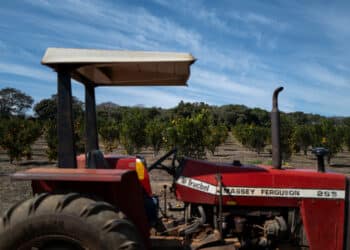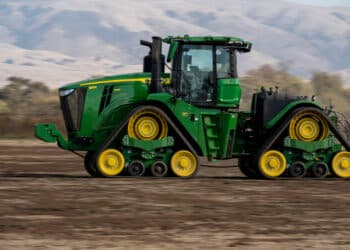Crop dusting planes are a key tool for keeping banana plantations free from pests, but the practice causes significant environmental and climate damage.
A small but growing number of plantations are using a novel solution: autonomous electric crop dusters that target spraying, reducing emissions and risks to workers’ health.
Startup Pyka’s aircraft — dubbed the Pelican Spray — is being used by major agricultural firms such as Dole Plc, SLC Agrícola SA and Heinen Brothers Agra Services, according to Michael Norcia, the company’s chief executive officer.
The technology has yet to displace gas-powered crop dusters in large numbers due in part to higher upfront costs and powerful incumbent companies. But if it can, it would substantially benefit workers and the environment.
“Replacing a traditional spray plane with the Pelican Spray is equivalent to removing 100 internal combustion engine cars from the road in terms of carbon emissions,” said Norcia.
Traditional crop-dusting methods can struggle with precision, increasing the amount of pesticide and fungicide sprayed. Chemicals commonly used on banana plantations up the risk of serious health problems for workers and nearby communities including sterility, cancer and neurological conditions, according to a 2023 literature review. The same study also found they damage local ecosystems and are particularly deadly to amphibians.
While Pyka’s solution doesn’t do away with chemicals, the startup says it can lower their use. By setting a trajectory from the ground, drones can fly precise routes that reduce the spread of chemicals beyond where they’re needed.
Traditional aerial applications typically deliver about 91% of chemicals to crops, with the rest evaporating or drifting away. In contrast, Pelican Spray achieves closer to 96% accuracy, according to Norcia.
Its ability to fly at night — something out of the question for human-piloted crop dusters — offers another advantage: Some particularly problematic pests come out after dark. Targeting them when they’re most vulnerable improves results.
“We’ve observed firsthand the effectiveness of the Pelican Spray in managing pests and diseases, especially in banana plantations,” said Pericles Briante, a Brazil-based adviser for Pyka and a business development specialist at agtech company Dymaxion Labs. In addition to having an advantage over manned aerial sprayers, he noted Pyka’s aircraft also offer an improvement over ground-based systems, “which often cannot operate efficiently in wet or dense conditions.”
While Pelican Spray can apply pesticides more efficiently, it also threatens to take away work from crop duster pilots, many of whom are older, Briante said. Still, their job is a dangerous one.
“Crop dusting is not a job you wish for your children to pursue; it’s inherently risky,” said Mark Gudiksen, managing partner at Piva Capital. The firm led Pyka’s $37 million Series A funding round along with Prelude Ventures and participated in a $40 million Series B announced in September. Automation is safer and could open up new jobs programming the drones to fly, he added, which will “shift the focus to managing technology rather than performing hazardous tasks.”
The startup is one of several companies leveraging technology to reduce agriculture’s environmental impact. Canadian startup Precision AI has developed a smart crop-spraying drone that also cuts down on chemical use as have firms like Rantizo and Guardian Agriculture. Other precision agriculture tools include electric tractors, ground sprayers and AI-enabled weeding equipment.
In an increasingly crowded field, Pyka unveiled the Pelican 2 earlier this month. The company announced that the new model start at $550,000 and will sport a 300-liter (80-gallon) tank that Pyka says allows the craft to cover up to 85 hectares (210 acres) per hour. Traditional crop-dusting planes can carry nearly 950 liters or more, covering much larger areas per flight, according to Alexander Liddington, a sustainable agriculture analyst at BloombergNEF.
Frequent refills and battery swaps — Pyka ships five sets with each sprayer — could impede widespread adoption. Additionally, Liddington challenged the idea that aerial spraying is more precise than ground-based methods.
“While the Pelican Spray represents a significant advancement in electrification and automation, its capacity and operational limits require further development for broader adoption,” he said.
But Pyka also has other plans for its aircraft. They include transporting cargo with a craft that can accommodate a payload of up to 400 pounds and the ability to transport it up to 200 miles. Customers include the US Department of Defense.
“We see a future where electric aircraft are not just for niche applications but are integral to mainstream aviation across multiple sectors,” Norcia said.









